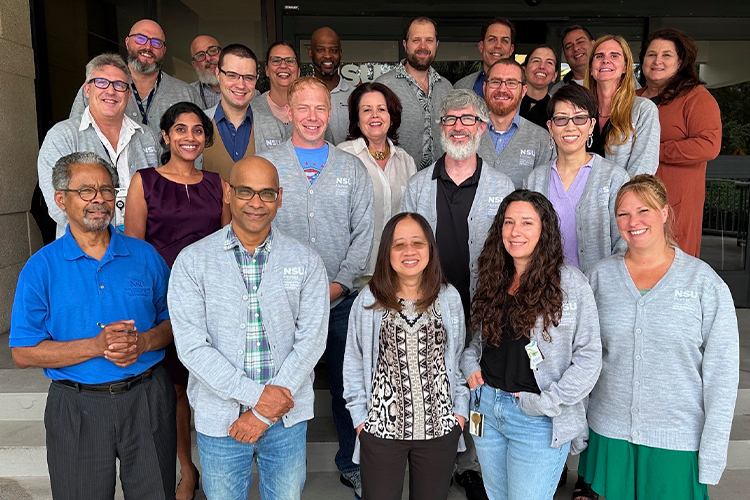The Clinical Systems Biology (CSB) group at Nova Southeastern University's Institute for Neuro-Immune Medicine uses analytical approaches including dynamical systems based on nonlinear differential equations, Boolean probabilistic networks, graph theory and networks, and methods of information theory and statistics to map biological structures and function in complex biological systems. We apply these methods in a multiscale fashion, so that information from different biological organizational scales (genomics, proteomics, cellular, systems) can be represented and integrated.
Our methodologies are applied to understand the communications between the nervous, endocrine, and immune systems and its participation in medical conditions of interest.
Research Focus
Current research efforts at the CSB group are focused on understanding immune dysfunction at both periphery and central nervous system (CNS) and neuroinflammation from an integrated systems perspective. In particular, our group is investigating how subtle imbalances in the interplay between the immune system’s multiple components as well as its interactions with the endocrine and nervous systems may lead to complex disorders such as myalgic encephalomyelitis/chronic fatigue syndrome (ME/CFS), Gulf War Illness (GWI), long-term neurological conditions associated with COVID-virus, and other neurodegenerative disorders such as Alzheimer’s Disease (AD) and Parkinson’s Disease (PD).
Illnesses such as these continue to defy a conventional one-piece-at-a-time approach as well as traditional mechanistic representations. As none of the body’s systems function in isolation, a systems thinking approach is a must. New insight can be achieved by considering the immune, endocrine, and nervous systems as part of an overarching and integrated whole. This comprehensive approach is at the very heart of systems biology: an emerging science where context and interaction are key focal points and where the science of complexity, self-organization, and self-organized criticality will play a fundamental role.
Opportunities in the Clinical Systems Biology Group
Funded positions will be posted here. Check back for updates.
Type of work: The group focuses on building mathematical, statistical, and computer models of neuroinflammation at molecular, cellular and systems levels. Additionally, the group focuses on describing comorbidities such as diabetes, obesity, hypertension resulting either from neuroinflammation or pre-existing among patients and, the modeling of viral reactivation (Epstein-Barr virus, COVID, herpes) and its impact on neurological conditions. These models are validated with data generated either from laboratory groups at INIM or from external collaborators. No wet lab work is performed; the data is sourced externally or from the literature.
Skills required: Students and fellows should be proficient in Calculus, Statistics, and Programming (Python, Matlab, Mathematica, R), familiar with LaTeX, Linux, and have experience with solutions of systems of differential equations, agent-based systems, descriptive, inferential and regression statistics. A basic knowledge of machine learning techniques is encouraged.
If you meet the criteria and are interested in our research, visit the publications and research pages on our website. For more information, contact dquesada@nova.edu. Even if no position is listed, highly qualified candidates should still inquire.
How to apply: Email your CV (PDF) and a statement of interest to dquesada@nova.edu with the subject: Potential CSB Candidate - <Your Name>.
- Postdoctoral Fellow The ideal candidates should have a Ph.D. in Computational Biology (bioinformatics, biostatistics, mathematical modeling of biological system), Physics (computational, quantum, particle, theoretical), or Applied Mathematics, with solid programming skills in Python, Octave, and/or C. An interest in neuroinflammation and neurodegeneration, along with excellent written English skills. Biology experience is a bonus, but not required.
- Graduate (M.Sc. and Ph.D.) Student Supervision of graduate students performing research at the CSB is M.Sc. students through the Biological Sciences, - Research, or Experimental Psychology graduate programs, or Ph.D. students through the Pharmaceutical Sciences graduate program as well. If you would like to register in a different program at NSU while still working in the CSB lab, please send a request; co-supervision through the department of your choice can be arranged, within reason. Applications are due by the end of July for a September start date, or by the end of November for a January start date.
- Undergraduate Research Assistant If your cumulative GPA is above 3/4 and you are interested in the research being conducted in our group and you have programming experience, contact Dr. Craddock at to inquire about possible positions available within the group.
Meet Our Team
David Quesada, Ph.D.
Director, Computational Clinical Systems Biology Group
Associate Professor, Computational Biology
Dr. Kiran Patel College of Osteopathic Medicine
Institute for Neuroimmune Medicine
Health Professions Division
Jonathan Herrera
Research Database Manager
Research Volunteers
- Isadora De Abreu
- Anushka Agrawal
- Sandeep Dronavalli
- Modeline Jean Pierre
- Divya Komandooru
- Nandan Shastry
- Caleb Siguenza
- Esha Sultana
 Travis Craddock, Ph.D.
Travis Craddock, Ph.D.
Canada Research Chair - Tier I
Associate Professor of Biology, University of Waterloo
Travis J.A. Craddock, Ph.D. is a Canada Research Chair and Associate Professor in the Department of Biology at the University of Waterloo. His research applies computational biology and quantum biophysics methods towards the purpose of identifying novel treatments for complex chronic illness involving neuroinflammation. Dr. Craddock received his Ph.D. in the field of biophysics at the University of Alberta where his graduate research activities focused on subneural biomolecular information processing, and nanoscale neuroscience descriptions of memory, consciousness and cognitive dysfunction in neurodegenerative disorders.
Dr. Craddock's current research activities are focused on using a theory driven approach to understand the underlying molecular regulation of chronic illness resulting from exposure to neurotoxins, such as anesthesia and nerve agents, in order to improve diagnosis and putative treatment strategies.
Current areas of academic focus:
- Cellular information processes and molecular neuroscience
- Biophysics of neuroinflammatory/neurodegenerative diseases: Alzheimer's, Parkinson's, Gulf War illness (GWI) and myaglic encephalomyelitis/chronic fatigue syndrome (ME/CFS)
- Systems neurobiology
- Quantum neurobiology
Program Support
- Rill Friedman
Research Highlights
-
DRUGPATH: The Drug Gene Pathway meta-database (https://drugpath.app)
-
Jaundoo R, Craddock TJA. DRUGPATH: The Drug Gene Pathway Meta-Database. Int J Mol Sci. 2020 Apr 30;21(9). doi: 10.3390/ijms21093171. PubMed PMID: 32365960; PubMed Central PMCID: PMC7246871. Read More
-
Jaundoo R, Bohmann J, Gutierrez GE, Klimas N, Broderick G, Craddock TJA. Towards a Treatment for Gulf War Illness: A Consensus Docking Approach. Mil Med. 2020 Jan 7;185(Suppl 1):554-561. doi: 10.1093/milmed/usz299. PubMed PMID: 32074351; PubMed Central PMCID: PMC7029833. Read More
- Genetic Predisposition for Immune System, Hormone, and Metabolic Dysfunction in ME/CFS: A Pilot Study with Travis J.A. Craddock, Ph.D. Watch Webinar

Get in Touch
Phone:
(954) 262-2874
Clinical Systems Biology Group
Institute for Neuro-Immune Medicine
Nova Southeastern University
3300 S. University Drive
Fort Lauderdale, FL 33328-2004
Hours:
Monday - Friday
9:00 a.m. - 5:00 p.m.
Connect with INIM on Social
For more information on becoming a donor or joining our newsletter, please email mcarr1@nova.edu.

